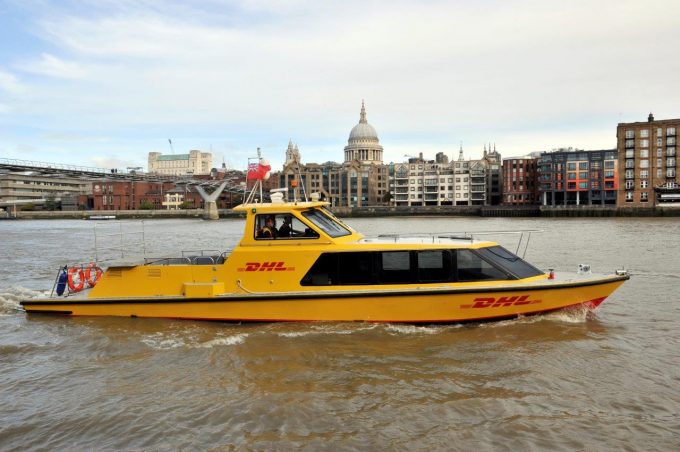NOCC adds third ‘ammonia-ready’ PCTC newbuild orderbook
Norwegian Car Carriers (NOCC) has added a third ‘ammonia-ready’ 7,000ceu LNG-powered ship to its two-vessel, ...
TFII: SOLID AS USUALMAERSK: WEAKENINGF: FALLING OFF A CLIFFAAPL: 'BOTTLENECK IN MAINLAND CHINA'AAPL: CHINA TRENDSDHL: GROWTH CAPEXR: ANOTHER SOLID DELIVERYMFT: HERE COMES THE FALLDSV: LOOK AT SCHENKER PERFORMANCEUPS: A WAVE OF DOWNGRADES DSV: BARGAIN BINKNX: EARNINGS OUTODFL: RISING AND FALLING AND THEN RISING
TFII: SOLID AS USUALMAERSK: WEAKENINGF: FALLING OFF A CLIFFAAPL: 'BOTTLENECK IN MAINLAND CHINA'AAPL: CHINA TRENDSDHL: GROWTH CAPEXR: ANOTHER SOLID DELIVERYMFT: HERE COMES THE FALLDSV: LOOK AT SCHENKER PERFORMANCEUPS: A WAVE OF DOWNGRADES DSV: BARGAIN BINKNX: EARNINGS OUTODFL: RISING AND FALLING AND THEN RISING

DP-DHL has unveiled two initiatives that cut congestion and emissions, as part of its GoGreen initiative.
It has developed a Thames freight service for small packages going to central London, with final delivery by bike, and will be operated by Uber partner Thames Clipper Logistics.
While DHL has a canal delivery network in Venice, this will be its first high-speed river freight delivery service.
“With traffic and poor air quality becoming an increasing problem in urban areas like London, we’re committed to finding a better blend of transport,” said Ian Wilson, chief executive UK&I, DHL Express.
“This new and unique service, combining electric vehicles, riverboat and bikes, creates fast and efficient access across the capital.”
Robin Mortimer, chief executive for Port of London Authority (PLA), said: “The shipment of bulkier freight by river already takes more than 200,000 HGVs off the capital’s roads every year. A river boat and emission-free last-mile delivery is a great innovation, and the ideal combination for the city’s next evolution.”
The move follows news that Manston Airport, which hopes to re-open as an air cargo hub, is also in talks with the PLA over river freight movements.
Meanwhile, yesterday, DHL Global Forwarding also announced it would “neutralise” the carbon emissions from its LCL ocean freight shipments from 1 January. It will compensate for the emissions by using biofuels, with the reduction benefits allocated to the customer,
“To fight against climate change, the transport sector needs true decarbonisation,” said Tim Scharwath, chief executive. “Sustainable fuel solutions are the key lever to change the fuel mix and, ultimately, reduce carbon emissions in ocean freight.
“Even though we are in unprecedented times, due to the pandemic, we have to make sure that climate protection and sustainability efforts remain at the forefront.”
Comment on this article